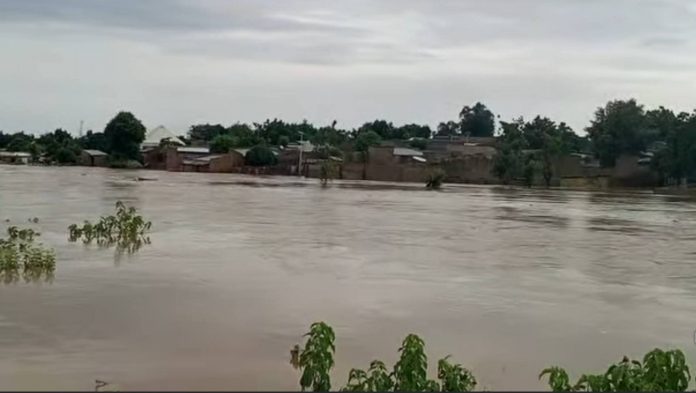With flooding wreaking havoc across several regions, local and state authorities are ramping up responses to protect affected communities and prevent further loss.
In Yobe State, officials have begun relocating families forced from their homes in Garin Kolo, Nangere Local Government Area, after severe floods destroyed residences and contaminated wells.
On Wednesday, Governor Mai Mala Buni launched a relocation process for 250 displaced households. Dr. Mohammed Goje, Executive Secretary of the State Emergency Management Agency, described the initiative as an effort to restore “safety, dignity, and hope for recovery” for those impacted.
Twenty-two temporary shelters have already been set up at the new settlement site, with additional units in progress. The government has also provided a water reservoir, five emergency toilets, and stationed an ambulance on location to address urgent medical needs.
Security personnel from the NSCDC and police have been assigned to the area, and individuals requiring further medical attention are being referred to General Hospital Nangere.
Food baskets have been distributed to each family, and Dr. Goje assured that aid efforts would continue and expand over the coming weeks.
He extended gratitude to the Emir of Tikau, Nangere local officials, the Ministry of Health, RUWASA, and humanitarian organizations for their substantial roles in the relief efforts.
Additionally, a joint initiative between the Yobe State Emergency Management Agency (YOSEMA) and the National Emergency Management Agency is underway, delivering food relief to 518 families across eight Potiskum communities, including Karofi, Bayan Old Prison, Unguwar Makafi, Tsangaya, Ramin Kasa, Jigawa Bayan NTA, Yandiski, and Ampana.
Beneficiaries receive rice, beans, pasta, vegetable oil, and assorted condiments.
Dr. Goje reported that, so far, more than 600 residents from 21 different communities have been uprooted by flooding, emphasizing that collaboration between federal and state bodies remains key to bringing back stability.
In Ondo State, flood prevention projects have intensified, with authorities carrying out canal expansions across all 18 local government areas.
While inspecting progress in Akure on Wednesday, Elisha Ebijimi, Special Adviser to the Governor on Erosion Control, cautioned residents against blocking drainage by dumping refuse.
He noted that recent works covered Ilaje, Ese Odo, Odigbo, and Ile Oluji, with Akure South as the most recent focus and plans for Oba-Ile in Akure North underway.
Drainage channels previously just four metres wide are being widened to up to 25 metres and deepened to four metres. Once expansion is complete, concrete reinforcements will be added, with backing from the World Bank for long-term resilience.
“We assured the people of Ondo that our government will bring an end to flooding, but community members must do their part by refraining from indiscriminate waste disposal,” Ebijimi said.
Sokoto State has also taken action: the State House of Assembly has urged urgent diversion of floodwaters that have inundated five villages along River Rima in Sabon Birni Local Government Area.
The motion, raised by Alhaji Al-Mustapha Aminu (APC–Sabon Birni North) and supported by Alhaji Sa’idu Ibrahim (APC–Sabon Birni South), highlighted how severe rainfall has made the Goronyo–Sabon Birni road at Gajit and Zalla Bango impassable—impacting local business and emergency services.
Aminu listed Makuwana, Dangawo, Faru Kumbula, Infaruna, and Magajin Dawaki as the most affected villages, and called on both NEMA and SEMA to provide urgent relief materials for displaced families.
The Assembly, in another motion, approved improvements for Amanawa Infectious Diseases Hospital, including new wards, access infrastructure, and upgraded medical equipment to strengthen public healthcare in the region.










